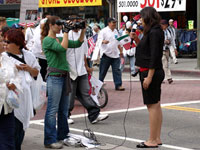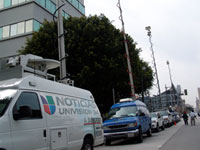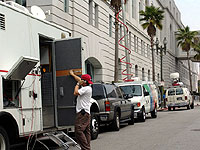To the Streets! Hispanic Media at the Forefront of Protest March
News Report, Eduardo Stanley, Translated by Elena Shore, New America Media, Mar 27, 2006 | news.pacificnews.org
LOS ANGELES, Calif.- It was the biggest protest in the city's history, according to the local police department. More than half a million Latinos took to the streets Saturday, March 25 wearing white t-shits, carrying signs and waving American flags, along with flags from their native countries including Argentina, El Salvador, Guatemala, Mexico and Peru.
 On small stage on the corner of Broadway and Second Street, surrounded by huge speakers, cables and audio mixers, Spanish DJs kept up the crowd's spirits, giving non-stop information and advice.
On small stage on the corner of Broadway and Second Street, surrounded by huge speakers, cables and audio mixers, Spanish DJs kept up the crowd's spirits, giving non-stop information and advice.
"We can't see the flags. Where are all the flags?" called one of them over the speakers; and in response tens of thousands of flags waved in the air, above a river of white shirts that covered more than ten blocks of Broadway and extended in neighboring streets beyond.
The DJs were part of a campaign in which California's Spanish media outlets played a pivotal role.
They helped to mobilize hundreds of thousands of people against HR 4437, introduced by Wisconsin Republican James Sensenbrenner, and approved Dec. 16 by the House of Representatives in a vote of 239 to 182. Now in the Senate, the bill would criminalize undocumented immigrants-who total 11 million people in the United States-and punish those who help them, such as social workers or religious groups. In addition, the bill calls for the construction of a wall along the U.S.-Mexico border.
 "At the beginning, about ten groups wanted to organize the protest in Los Angeles," says Noé Hernández, an immigrant rights activist from the Central Valley. "Then they invited members of the Spanish press, and everything changed."
"At the beginning, about ten groups wanted to organize the protest in Los Angeles," says Noé Hernández, an immigrant rights activist from the Central Valley. "Then they invited members of the Spanish press, and everything changed."
According to Hernández, while organizations were prolonging their talks and negotiations, radio DJs decided to broadcast a call directly to the community. As more Spanish radio stations joined the movement-including stations in cities across California-they helped mobilize people across the state.
But in keeping with the march's climate of anonymity, community and solidarity, the DJs on the stage did not identify which stations they were from. Organizations also kept their names out of the spotlight. The crowd itself dressed in white shirts as a symbol of peace and unity.
Well-known DJ "Eddie" Sotelo, known as El Piolín, launched an intensive broadcast campaign about immigration while mobilizing people to participate in the march. His radio show, produced in Los Angeles and aired nationally by Univision, is one of the most popular among Spanish-speaking listeners.
"El Piolín did an incredible job, he did various interviews and never failed to stress the importance of the march for the dignity of our community," says Hernández, who was interviewed by El Piolín before the protest. "He also interviewed one of the 'Minutemen' and I think this convinced people to participate more than anything because that man insulted Latinos and said we should all be deported, even him, El Piolín!"
"Lots of people started calling the radio station asking for information about the protest, so we decided to do something," says Diana Miramontes, DJ and programming assistant for KLOG 98.7 FM in Merced. "We interviewed an activist to explain the bill HR 4437 and we broadcast information about the march." The number of calls about the protest increased, including one person who offered a free bus and was looking for a licensed bus driver to drive down a group of people.
"We invited people to participate," Miramontes says with sincerity. "As a Latina I believe it was the right thing to do. A lot of people will suffer if this law is passed."
Hernández says other local stations in the Central Valley conducted interviews with immigration activists, allowing a large segment of the population to have access to this information.
In Los Angeles, Spanish-language newspaper La Opinión published various articles in the days leading up to the protest. The day before the march, it published an extensive article with details for those interested in participating.
The headline on the front page of La Opinión Saturday, March 25 was "A las Calles!" (To the Streets!).
Spanish TV stations Telemundo, TV Azteca and Univisión helped mobilize people to go to the protest in Los Angeles in a campaign similar to that of 1994 when Spanish TV stations played an active role in protesting Proposition 187 in California.
 In Fresno, the day before the march, a reporter on Univision announced what time and where people should meet to drive down to Los Angeles. The reporter even offered advice about the long drive, reminding viewers to check their cars' oil and antifreeze before making the trip.
In Fresno, the day before the march, a reporter on Univision announced what time and where people should meet to drive down to Los Angeles. The reporter even offered advice about the long drive, reminding viewers to check their cars' oil and antifreeze before making the trip.
"Thank you DJs for awakening my people," read a large sign carried by Aniceto Polanco, an immigrant from de Guerrero, México. "I want to thank the Spanish media," she says. "They did a great job."
"I found out about this through the radio. I remember the DJs saying that we have to wake up, we have to participate for our own good and the good of our families," says Adrián López, who traveled from Madera to Los Angeles with his family. He says he is grateful for the role Spanish radio played. "They were right. Now I hope the politicians take note."
Photos by Eduardo Stanley